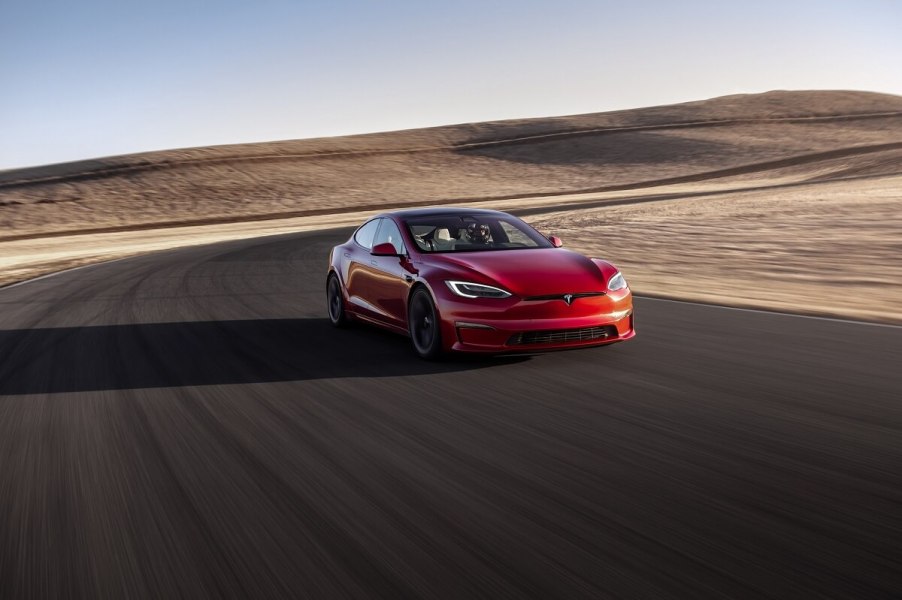
How Many Miles Can a Tesla Model S Last?
The historical benchmark for a long-lived car is typically 200,000 miles. The hypermiler category has been traditionally dominated by Toyota and General Motors vehicles, all of which had internal combustion engines. Yet, as EVs are becoming more mainstream, it would be nice to know if owners can achieve similar numbers.
iSeeCars recently conducted a study to see which vehicles could last the longest. The list mainly featured gasoline-powered examples, but a few EVs were included. The Tesla Model S had to contend with the Nissan Leaf in longevity, and below is how the all-American EV stacked up.
How did iSeeCars determine its stats?

iSeeCars scrutinized over two million cars on the road between January and October 2022. The automotive search engine selected vehicles produced and sold for at least 10 of the past 20 years. Therefore, the EV list included only two entries.
Electric cars relinquish the need for scheduled tune-up and items like oil and fluid changes or flushes in various components. This immensely simplifies the process of maintaining an EV, which indicates they should save owners time and money.
How long can a Tesla Model S last?
The study determined that the Tesla Model S has a potential lifespan of 133,998 miles. Nevertheless, iSeeCars found that 0.3% of all Tesla Model Ss have reached 150,000 miles.
Battery longevity is a subject among Model S owners and enthusiasts. Considering the lithium-ion unit makes up roughly 40% of the vehicle’s cost, there’s no wonder why. However, a Model S’s endurance is backed up by an excellent battery warranty.
Teslarati asserts that the Model S’s Battery Limited Warranty spans eight years and 125,000 miles. But that’s only for the 70-kWh examples. Those with 85-kWh units have no limit on years or miles when fixing or replacing the battery.
Nevertheless, California requires an even lengthier 10-year, 150,000-mile warranty for all electric car batteries. Toyota has adopted the same policy but in all 50 states.
How reliable is the Tesla Model S?
Keeping with the battery, like all lithium-ion packs, there will be a power capacity loss over time. It will depend on driving style, charging frequency, and general use, but there are some standard figures.
InsideEVs reported on one 2015 Model S owner’s experience in a car with 146,000 miles on the clock. With over 1,000 charges on the 70-kWh battery, the unit still had 90% capacity after five years. Leaving 62.4 kWh left, it works out to around 1% battery capacity loss for every 15,000 miles driven.
Another owner reported their 2013 Model S P85+ losing 7.5% battery capacity over 113,000 miles. Reportedly, the range decreased from 265 miles to 245 miles over six years of ownership.
Out of all the EVs iSeeCars tested, the Model S ranked far above others in the segment in reliability. With a reliability score of 9.4 out of 10, it was ranked first compared to the Hyundai Ioniq Electric’s 7.9 and the Nissan Leaf’s 7.6.
Is the Tesla Model S a good car?
The Tesla Model S has consistently ranked near the top of the luxury EV rankings. U.S. News was decidedly impressed with the 2022 model year’s 405-mile range, neck-snapping acceleration, comfort, and abundance of cargo space.
The base Model S features a 100-kWh lithium-ion battery pack and two electric motors—one powering the front and one powering the rear. The Plaid trim features an additional electric motor at the rear axle, dropping 0-60 mph time from 3.1 to 1.99 seconds.
Which EV lasts the longest?
Tesla CEO Elon Musk claims that Tesla batteries should last between 300,000 and 500,000 miles. Given the above figures, owners should expect 20 to 33 years of life out of their EVs.
Since pure EVs haven’t been around that long, it’s hard to tell now exactly which one will last the longest. As of now, the Tesla Model S is the undoubted victor. It’s been seen, though, that EVs actually last much longer than what manufacturers, and indeed the public, originally thought.


